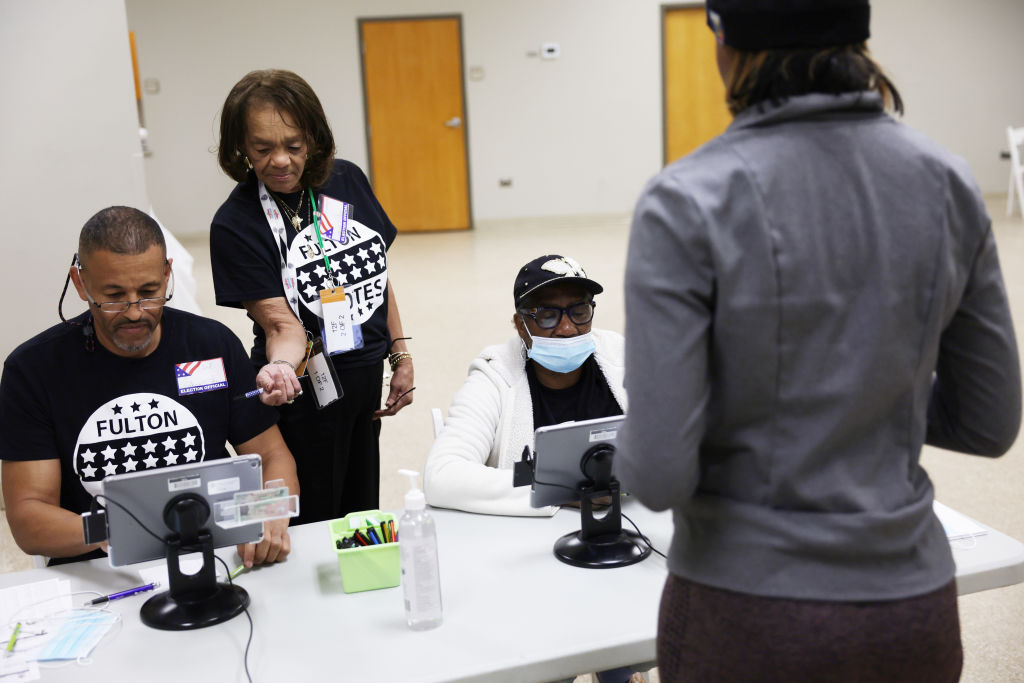Georgia Runoff Election Administration Compromised By SB 202
Commentary: I Tried To Cast My Ballot In The Georgia Runoff And Almost Couldn’t Vote

Source: Alex Wong / Getty
After 23 years of voting, I had my first scare. I endured long lines voting in Ohio in 2004 with two small children in tow. In 2014, I almost forgot my Id when heading to vote in my first Georgia election. But I have never worried about my ability to cast my ballot until Tuesday, Dec. 6.
My daughter could not take advantage of the limited early voting period after the Thanksgiving holiday, so I agreed to vote with her on Election Day at our regular polling location. While I had requested an absentee ballot when I was sick last month, I knew that I could cancel my absentee ballot at the poll and cast my vote.
It should have been quick and easy. It wasn’t. My daughter was in and out without issue. But I sat and waited patiently for the problem to be resolved. But I wasn’t the only one confused by the challenge of canceling my absentee ballot. The poll workers were also perplexed by the red banner with my voter information at the top of the screen. I’ve voted in every election since we moved to Georgia in 2014.
Speaking with NewsOne ahead of Election Day, voting rights and election protection expert Helen Butler said the challenges facing voters were to be expected given the combination of SB 202 limiting the time for runoff and the confusion caused by the secretary of state’s initial guidance on Saturday voting.
She explained that election administrators around the state had to essentially work double time winding up the Nov. 8 election and required risk-limiting audit to turn around and prepare for the Dec. 6 runoff.
“Going from nine weeks to for the runoff period down to four weeks made it difficult,” said Butler, who leads the Georgia Coalition for a People’s Agenda. “It truncated the timeframe and basically made vote by mail nonexistent. It made it such that the election officials were scrambling to ensure they got all the equipment set up and reprogrammed for the new election.”
SB 202 impacted election administration.
Butler spent over a decade as a member of the Morgan County Board of Elections before she was removed thanks to a new mechanism for reconstituting boards of elections. She said SB 202 impacted the ability of election administrators to effectively carry out elections, including effectively supporting poll workers.
“It really hurt from an administrative side and from a voter side as well,” she said. “Making sure that they have enough people to work that cycle, making sure that you know there were enough sites available, those kinds of things.”
Having enough people at the polling location is critical, if for no other reason than to ensure issues don’t hold up other voters. It took three poll workers 45 minutes to figure out why my absentee ballot could not be canceled so I could vote in person. The on-site staff phoned help from “downtown” to figure out the issue. The process to cancel ballots outlined in the manual did not match the onscreen options in the electronic poll book.
Everyone holding their breath on this election’s outcome must understand that Georgia voters have been trying. While my experience may have been a fluke, it’s another example of the system causing issues and delays that could burden the ability to vote.
Butler said the ultimate responsibility for issues arising from SB 202 lies with the state’s Republican-controlled legislature.
“Before they enacted this bill, there were actual election officials and supervisors that testified, telling them that this was unrealistic,” she explained. “But of course, they didn’t listen to the election officials.”
Election protection is a must.
As I waited for my voting issue to be resolved, I contacted a colleague who works election protection with Georgia voters. Thankfully, my problem was resolved, but she advised me to contact the election protection hotline if further issues arose.
I was close to calling 800-Our-Vote, a non-partisan election protection coalition hotline led by The Lawyers’ Committee for Civil Rights Under Law. Julie Houk, managing counsel for election protection at the Lawyers’ Committee, told NewsOne that the organization worked alongside local volunteers to support voters throughout the election period, including the runoff.
“We’re helping voters every day,” Houk explained. “During the election periods, we’re working hand in hand with our partners in the states, who have volunteers on the ground.”
Houk also said the change to the runoff in SB 202 could impact voters relying on absentee ballots. Delays in receiving and returning the ballots and changes to the absentee ballot drop box availability could prohibit some from voting in the runoff.
“If they don’t get their ballot, they won’t have recourse because they can’t vote in person, and they haven’t gotten their absentee ballots,” she said. “That’s another direct impact of what’s happened with SB 202.”
But Georgia voters aren’t alone.
While Georgia is the last state standing in terms of wrapping up the 2022 midterm elections, the challenges and frustrations experienced by voters are a problem being experienced across the country. Taifa Smith Butler, president of the democracy-focused think-and-do-tank Demos, put the challenges in Georgia in a broader context.
“Anti-voter laws have turned a fundamental right into a series of cruel, arbitrary obstacles and challenges that challenge people’s ability to engage in our democracy,” Smith Butler said. “They alienate voters from civic life when voting should be fundamental but also seamless.”
From voter challenges to long lines, precinct changes and restrictions on absentee ballots, post-2020 voters have had to climb new hurdles to access the ballot. But despite the host of issues impacting voters, they have risen to the challenge.
Taifa Butler said the political and public education in Georgia supports the increase in electoral participation. Through its Inclusive Democracy Project, Demos works alongside ProGeorgia, the state’s c3 voter engagement roundtable.
“This is why you see an all-time high of turnout and people engaging on the issues and policies they most care about,” she said. “Typically, partners lead the way and tell us how we can provide the best resources and support so they can do their best work.”
Over the past decade, Demos has supported Georgia organizations, including litigation support, public education campaigns and getting voter education materials to people incarcerated in several county jails around the state. For Smith Butler, supporting pro-democracy groups provides a blueprint for building a more e inclusive democracy nationwide.
“Georgia is certainly a great example of how we’ve seen infrastructure invested in the organizing and civic engagement apparatus built up over decades,” Smith Butler said. “Demos is responding in this moment by looking at how we can build power for Black and brown communities over the next two decades. Voting rights is a foundation in our democracy.”
SEE ALSO:
When We All Vote And ACLU Of Georgia Lead Coalition Tour Ahead Of Runoff Election
Long Lines During Only Weekend Of Early Voting In Georgia Runoff Election





















